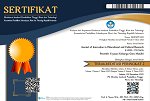Innovation of Tri Hita Karana Yoga Model in Improving Mental Well-being of Independent Student Exchange Program Participants
(1) Universitas Pendidikan Ganesha, Indonesia
(2) Universitas Pendidikan Ganesha, Indonesia
(3) Universitas Pendidikan Ganesha, Indonesia
(4) Tamkang University, Taiwan
Abstract
Keywords
Full Text:
PDFReferences
Alasmari, A. A. (2023). Challenges and social adaptation of international students in Saudi Arabia. Heliyon, 9(5), e16283.
Ammigan, R., Veerasamy, Y. S., & Cruz, N. I. (2023). Growing from an acorn to an oak tree: A thematic analysis of international students’ cross-cultural adjustment in the United States. Studies in Higher Education, 48(4), 567–581.
Anggana, I. P. S., Mudana, I. G., Triyuni, N. N., & Sukmawati, N. M. R. (2022). Tri Hita Karana as a form of pro-environmental behavior in Bindu Traditional Village. International Journal of Green Tourism Research and Applications, 4(1), 30–37.
Anggreswari, N. P. Y., & Gorda, A. O. S. (2020). Implementasi Tri Hita Karana Sebagai Budaya Organisasi di The Royal Pita Maha Hotel. Kamaya: Jurnal ilmu Agama, 3(2), 191-200.
Brett, C. E., Mathieson, M. L., & Rowley, A. M. (2023). Determinants of wellbeing in university students: The role of residential status, stress, loneliness, resilience, and sense of coherence. Current Psychology, 42(23), 19699–19708.
Creswell, J. W. (2014). Research design: Qualitative, quantitative, and mixed methods approaches. SAGE Publications.
Dewi, I. G. A. A. O. (2018). Culture of Tri Hita Karana on ease of use perception and use of accounting information system. International Journal of Social Sciences and Humanities (IJSSH).
Hassani, F., Zarea, K., Gholamzadeh Jofreh, M., Dashtebozorgi, Z., & Chan, S. W.-C. (2022). Effect of perceived social support, spiritual well-being, health literacy, and resilience on quality of life in patients undergoing hemodialysis: A structural equation model. Jundishapur Journal of Chronic Disease Care, 11(2).
Jensen, K. J., Mirabelli, J. F., Kunze, A. J., Romanchek, T. E., & Cross, K. J. (2023). Undergraduate student perceptions of stress and mental health in engineering culture. International Journal of STEM Education, 10(1), 30.
Ke, S., Chen, J., & Zheng, X. (2021). Influence of the subsurface physical barrier on nitrate contamination and seawater intrusion in an unconfined aquifer. Environmental Pollution, 284, 117528.
Kuswati, K., Wahyuni, T., & Mulati, T. S. (2022). The effect of yoga on the reduction of back pain in pregnant women’s trimester II and III. Jurnal Doppler, 6(1), 67–76.
Mudana, I. G., Suamba, I. B. P., Putra, I. M. A., & Ardini, N. W. (2018). Practices of Bali tourism development, threefolding, and Tri Hita Karana local knowledge in New Order Indonesia. Journal of Physics: Conference Series, 953, 012108.
Muliarta, I. W. (2021). The effectiveness of contextual-based yoga learning model on student character. JIPES - Journal of Indonesian Physical Education and Sport, 7(1), 60–68.
Nabilla, T., & Dwiyanti, E. (2022). Efektivitas yoga dalam mengatasi kecemasan ibu hamil dan depresi postpartum: Systematic review. Journal of Community Mental Health and Public Policy, 5(1), 40–49.
Ngui, G. K., & Lay, Y. F. (2020). The effect of emotional intelligence, self-efficacy, subjective well-being, and resilience on student teachers’ perceived practicum stress: A Malaysian case study. European Journal of Educational Research, 9(1), 277–291.
Novara, C., Martos-Méndez, M. J., Gómez-Jacinto, L., Hombrados-Mendieta, I., Varveri, L., & Polizzi, C. (2023). The influence of social support on the wellbeing of immigrants residing in Italy: Sources and functions as predictive factors for life satisfaction levels, sense of community, and resilience. International Journal of Intercultural Relations, 92(1), 101743.
Perbowosari, H., Prima Dewi, P. F. K. A., Sudarsana, I. K., & Wijaya, I. K. W. B. (2021). Peningkatan kesiapan belajar fisik siswa sekolah dasar dengan metode penapisan yoga asanas. Jurnal Penelitian Agama Hindu, 5(4), 200–210.
Pujiastuti, H., Suvati, D. A., Haryadi, R., & Marethi, I. (2020). Development of math module based on local wisdom and 21st-century skills: Linear equation system. Journal of Physics: Conference Series, 1480(1).
Roth, D., & Sedana, G. (2015). Reframing Tri Hita Karana: From ‘Balinese culture’ to politics. The Asia Pacific Journal of Anthropology, 16(2), 157–175.
Rusila, J., Widiyono, W., & Sutrisno, S. (2023). The effect of yoga exercise on blood sugar levels in type II diabetes mellitus patients in Karangasem Village, Surakarta. Jurnal Multidisiplin Dehasen (MUDE), 2(2).
Sugata, I. M., Suryanti, P. E., Juniartha, M. G., & Istriyanti, N. L. A. (2022). Efektivitas yoga terhadap peningkatan kualitas hidup ODHA di Bali. Jurnal Penelitian Agama Hindu, 51–57.
Sukareni, N. L., & Sukmana, A. I. W. I. Y. (2021). The integration of problem-based learning model on Indonesian language e-modules. Indonesian Journal of Educational Research and Review, 4(3), 502.
Suryantari, N. M. E., Suadnyana, I. N., & Wulandari, I. G. A. A. (2019). Pengaruh model time token berbasis Tri Hita Karana terhadap kompetensi pengetahuan IPA siswa kelas IV. Jurnal Pendidikan Multikultural Indonesia, 1(2), 62.
Suwindia, I. G., & Muliarta, I. W. (2023). Effectiveness of yoga practice to increase flexibility and anaerobic endurance in pencak silat athletes. SPORT TK-Revista EuroAmericana de Ciencias del Deporte, 12(34).
Vatankhah, M., & Tanbakooei, N. (2014). The role of social support on intrinsic and extrinsic motivation among Iranian EFL learners. Procedia-Social and Behavioral Sciences, 98, 1912–1918.
Wulandari, I. G. A. A. M., Sudatha, I. G. W., & Simamora, A. H. (2020). Pengembangan pembelajaran blended pada mata kuliah Ahara Yoga semester II di IHDN Denpasar. Jurnal Edutech Undiksha, 8(1), 1.
Yuniti, I. G. A. D., Wahyuni, A. A. A. R., Tirtawati, A. A. R., Suryathi, N. W., & Putra, I. G. A. C. S. (2022). Filosopi Kearifan Lokal Tri Hita Karana Dalam Menjaga Kelangsungan Kelompok Wanita Tani “Jempiring” Kabupaten Badung. Jurnal Penelitian Agama Hindu, 79-88.
Refbacks
- There are currently no refbacks.
View My Stats

